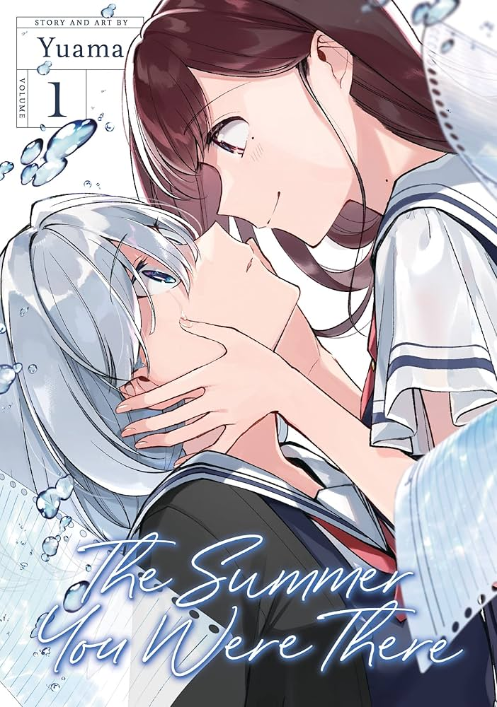
Man, it seems like the yuri/shoujo-ai genre is going through some kind of renaissance, what with so many of those titles being ported to the US, and several of them actually managing to range from good to amazing. I don’t typically find myself reading a lot of yuri or shoujo-ai manga, more due to lack of time and lack of interest in romance in general, but these past few years I read some really good ones, such as Goodbye My Rose Garden and Yume no Hashibashi, not to mention all the ones that are much more frank about exploring LGBT themes. I do plan on reading A Tropical Fish Yearns For Snow at some point because I hear that one’s really good, but I don’t know when that’ll be. On that note, I hadn’t initially planned on reading The Summer You Were There because its premise made it seem like it was going to be an archetypal romantic comedy, but I wound up discovering through TVTropes that it’s actually a tear-jerking drama on par with something like Your Lie In April and I Want To Eat Your Pancreas. I mention those two titles specifically because of certain plot developments that form the backbone of The Summer You Were There, and while I do genuinely like this manga, much more than I thought I would, there are some things holding it back from true greatness in my eyes.
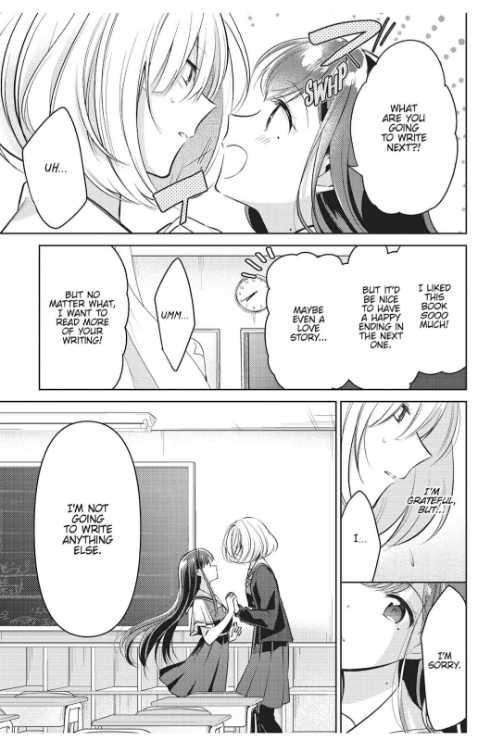
Silver-haired high school girl Shizuku Hoshikawa is completely dead inside. She is burdened with guilt over an incident she caused years ago, and although she loses herself in writing her own self-made novels, even that no longer brings her any joy. When summer break starts, Shizuku had initially planned on throwing away her novel and ending it all. As she’s about to do so, a popular classmate, Kaori Asaka, picks her novel out of the trash, took it home to read, and showers Shizuku with praise the next day, asking if she’ll write more stories, as she’s a huge fan of her work. When Shizuku tells her she has no plans on writing anymore, Kaori isn’t going to take this news lying down. Kaori suggests that the two of them become a fake couple so Shizuku can use the experience as material for her next novel. Only until the end of summer, that is. Shizuku at first isn’t too fond of the idea, but Kaori inserts herself into her life whether she likes it or not. It’s this fateful decision that serves as the impetus for an unforgettable summer together.
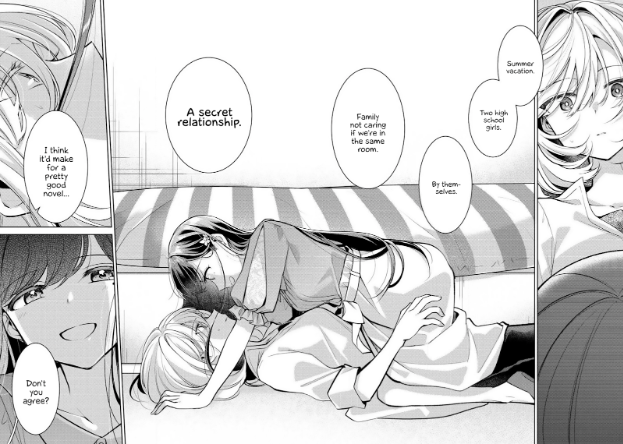
This is my first time reading one of Yuama’s works, and for the most part, her art is pretty good. I say for the most part because sometimes the proportions on the characters’ bodies can be off at times, like a nose will look crooked and legs or thighs will look too long, but it doesn’t happen all that often and goes away in later volumes. The paneling is easy to follow, screen tones are used to good effect whenever possible, there’s hardly any clutter in the backgrounds, and even the color pages are striking and beautiful. I will say that Yuama is really good at drawing facial expressions and really using them to convey a character’s emotions during the more dramatic beats without them looking cartoonish or silly. Granted, they’re not as strong as that of Yuu Watase’s Sakura Gari, but they still do their job well.
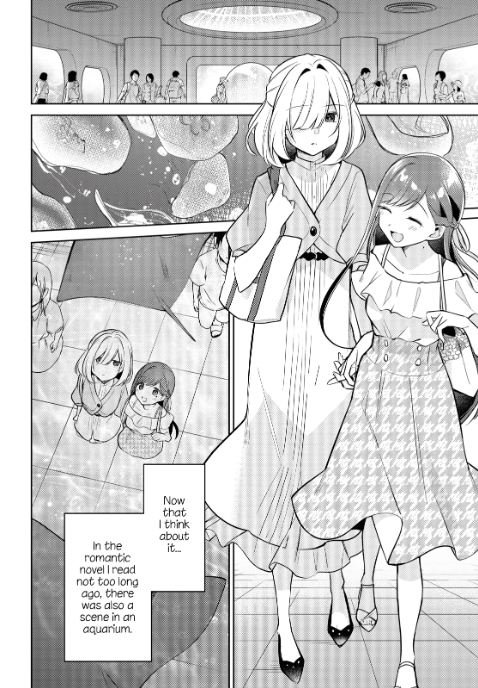
For a story like this, the two main characters need to carry it, and thankfully, Shizuku and Kaori manage to do this pretty well. They both grow and change over the course of the story, even if Kaori comes dangerously close to leaning into the dreaded Manic Pixie Dream Girl trope. That being said, the story does try to have Kaori be more than just the perky sick girl plot device who’s just there to fix Shizuku and advance her development. Going back to Your Lie In April and I Want To Eat Your Pancreas, I feel Kaori in this story is better written than Kaori Miyazono from Your Lie in April and Sakura from Pancreas, mainly in that she is shown to have unique character flaws that she has to deal with, develops alongside Shizuku, and does have a life outside of Shizuku, even if the manga’s short length doesn’t make it all that obvious. Sakura from Pancreas was literally nothing more than yet another cliche stereotype of a saintly tragic figure solely manufactured to advance the male lead’s development and teach moral lessons, and Kaori from Your Lie In April, from what I’ve heard, is also that, and along with being really bratty, manipulative, and selfish, many felt her methods of helping the male lead overcome his trauma came across as extremely cruel, insensitive, and tone-deaf. Thankfully, Kaori in The Summer You Were There has far more depth to her than Sakura from Pancreas, is genuinely kind but not without a backbone, and never resorts to the mean-spirited tactics that Kaori Miyazono does, so she already has that going for her. On the other hand, I wish more had been done with some of the side characters, namely Kaori’s sister Shiori, who literally has nothing to her other than worshiping Kaori and hating Shizuku. The rest of the side cast is perfectly fine.
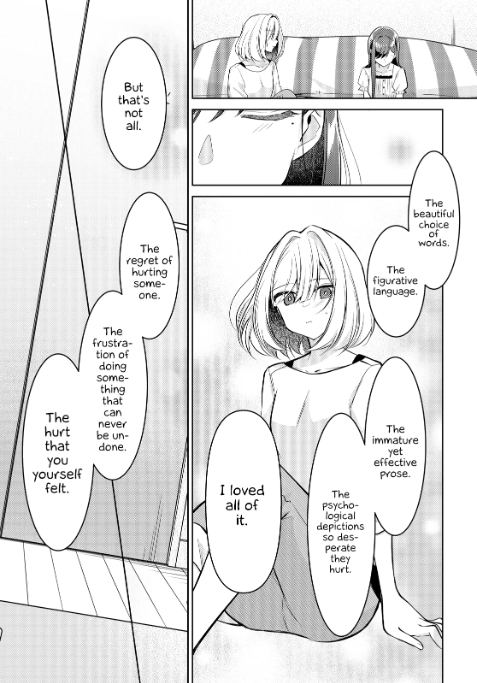
If there’s one thing I can say The Summer You Were There manages to pull off, it’s depicting bullying and the effects it has on people in a sensitive, nuanced, empathetic manner, and without resorting to condescension or melodrama. Granted, others might not agree, but your mileage may vary. The manga does succeed in making Shizuku sympathetic without trying to sugarcoat or downplay how bad her past actions were, nor does it try to invalidate or dismiss the trauma that Shizuku’s bullying had on her classmate Ruri. I also appreciate that the manga doesn’t try to make Ruri feel obligated to forgive Shizuku or force her to do so. Seriously, where was this nuance in stuff like A Silent Voice or Is It My Fault I Got Bullied? Yeah, I feel The Summer You Were There handled tackling the subject of bullying better than A Silent Voice. Come at me. As far as the later parts of Shizuku’s backstory that get revealed near the finale, normally I would find something like that to be really cheesy and over-the-top, but I actually went through something similar years ago, so I’m letting it slide.
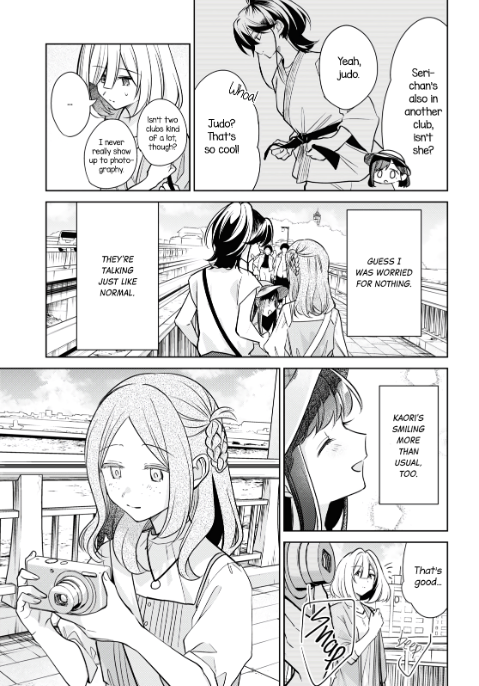
Outside its depictions of bullying, the manga is a perfectly fine story, even if a lot of the stuff its done has been done many times before. You wouldn’t be wrong to call it predictable based on everything that happens in its second half, and as much as I’m not a fan of the whole “sick girl helps the healthy MC then dies at the end” plotline because of how emotionally manipulative it can be if done wrong, The Summer You Were There did care about its characters and treated them with respect to the point where it did manage to get me genuinely invested in them, cliche plot or no. Granted, I know others might not feel the same way, so your mileage may vary on whether you even care about the second half of the story or not. To me, The Summer You Were There’s refined execution and respect it has for its story and characters manage to elevate it beyond just a shoujo-ai rehash of I Want To Eat Your Pancreas.
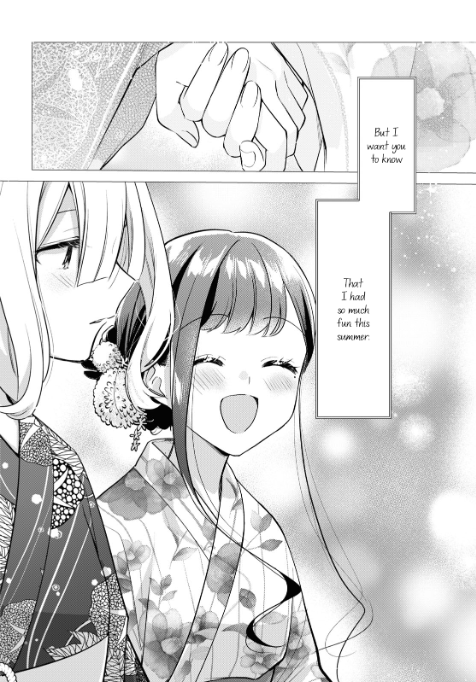
Overall, while it relies a little too much on a certain cliche and doesn’t develop the rest of its side characters, The Summer You Were There is a respectable shoujo-ai manga that manages to not only tackle a sensitive subject delicately, but avoids the common pitfalls that plague other stories of its caliber. Definitely give it a read if you like tragic romances that still manage to treat its characters with respect and empathy.
